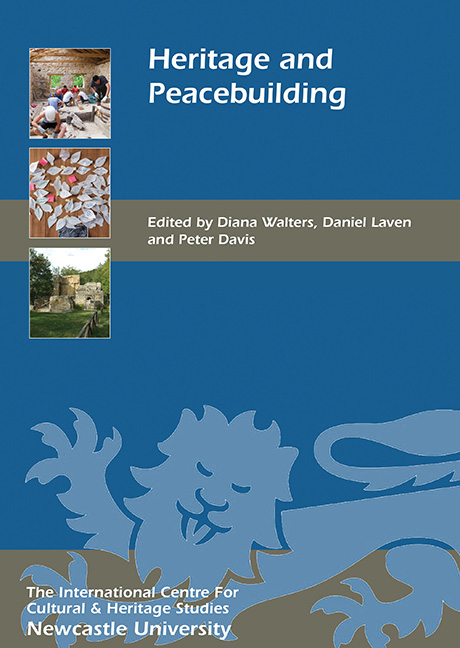Book contents
- Frontmatter
- Contents
- List of illustrations
- Acknowledgements
- List of abbreviations
- Preface
- Introduction
- NEW AND EMERGING IDEAS AROUND HERITAGE AND PEACE
- HERITAGE AND PEACEBUILDING IN PRACTICE
- HERITAGE, PEACEBUILDING AND SITES
- 14 A Conversation with Yongtanit Pimonsathean: Managing Conflict in Thailand
- 15 Challenging the Roots of Prejudice: the Monte Sole Case Study
- 16 Mau Mau: the Divisive Heritage of Liberation Struggle in Kenya
- 17 The Heritage of Geopolitical Borders as Peace Tourism Attractions
- 18 Rebuilding the Broken: Regional Restoration Camps as a Meeting Platform in the Western Balkans
- 19 Conflict or Reconciliation? Industrial Heritage Practices at a Turning Point
- 20 A Conversation with Saleem Ali: Environmental Challenges and Conflict Resolution
- List of Contributors
- Index
- Previous Titles
19 - Conflict or Reconciliation? Industrial Heritage Practices at a Turning Point
from HERITAGE, PEACEBUILDING AND SITES
Published online by Cambridge University Press: 16 February 2018
- Frontmatter
- Contents
- List of illustrations
- Acknowledgements
- List of abbreviations
- Preface
- Introduction
- NEW AND EMERGING IDEAS AROUND HERITAGE AND PEACE
- HERITAGE AND PEACEBUILDING IN PRACTICE
- HERITAGE, PEACEBUILDING AND SITES
- 14 A Conversation with Yongtanit Pimonsathean: Managing Conflict in Thailand
- 15 Challenging the Roots of Prejudice: the Monte Sole Case Study
- 16 Mau Mau: the Divisive Heritage of Liberation Struggle in Kenya
- 17 The Heritage of Geopolitical Borders as Peace Tourism Attractions
- 18 Rebuilding the Broken: Regional Restoration Camps as a Meeting Platform in the Western Balkans
- 19 Conflict or Reconciliation? Industrial Heritage Practices at a Turning Point
- 20 A Conversation with Saleem Ali: Environmental Challenges and Conflict Resolution
- List of Contributors
- Index
- Previous Titles
Summary
Peacebuilding is not necessarily always related to armed conflict but to other deep-seated and complex situations. The industrial decline in Sweden described here threatened livelihoods, wellbeing, community and individual sense of place, and created alienation and a sense of unease about how to adapt to change. This chapter is clearly different from others in this collection of essays as it deals with conflicts of a different kind: the impact on local communities in Sweden of the dramatic loss of localised, often small-scale industries. Interestingly, this industrial past has now been identified and acknowledged as heritage, with former industrial sites being used to heal rifts, restore memories, create pride in place and indeed contribute to local economies.
This chapter examines the processes that explain how small communities in Sweden with a conflict-based history around industrial closure and societal decline have used their industrial heritage as assets for local identity and economic renewal. It is based within the context of professional heritage practice but with an outlook on the value and importance of local non-professional engagement. In Sweden today former factories have been turned into around 1450 working life museums co-operating within the network ArbetSam, founded in 1998 (Arbetsam 2013). The museums are distributed widely across the country, this geographical spread and sheer numbers indicating the importance of local non-professional activities with a high degree of community involvement.
Starting from the premise that heritage processes should engage and be of value for people rather than for the heritage sector, it could be argued that local engagement has been far more important than formal heritage practice, and such engagement is a key factor for the use of heritage as a resource for reconciliation and peacebuilding processes. Formal practice is here understood as the operations normally and traditionally performed by the professional field and specifically its weakness for only targeting the tangible properties of heritage assets. Industrial remains and their associated memories have, over time, gained increased meaning and substance for local communities and such locally based non-professional – amateur in its best sense – activities have thus in several cases resulted in de facto reconciliation processes. These processes can be understood as multi-layered.
- Type
- Chapter
- Information
- Heritage and Peacebuilding , pp. 221 - 234Publisher: Boydell & BrewerPrint publication year: 2017



